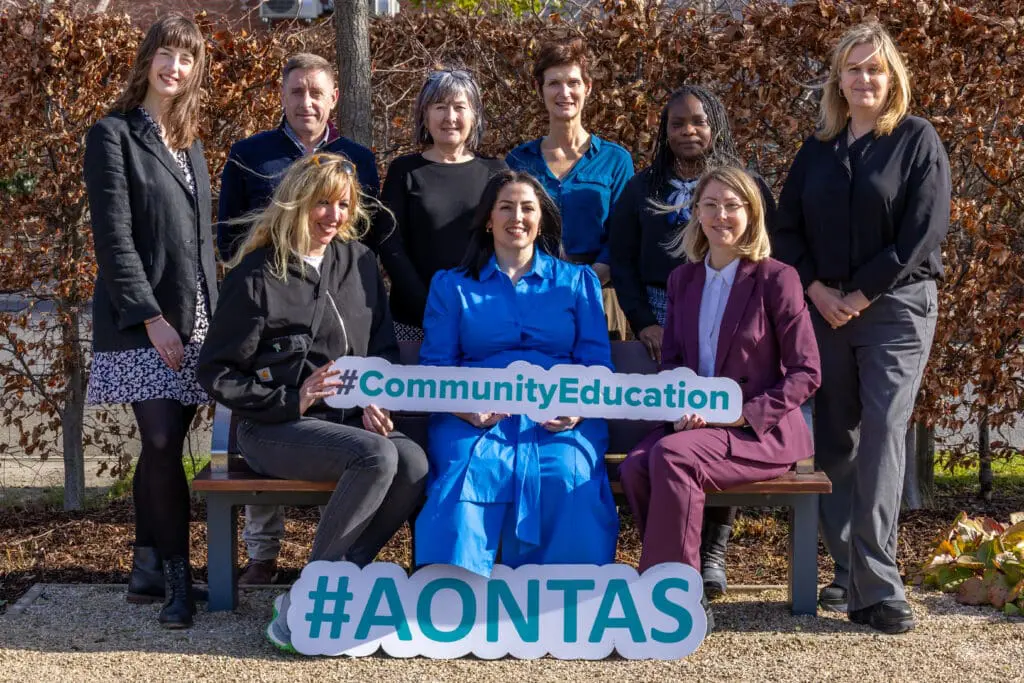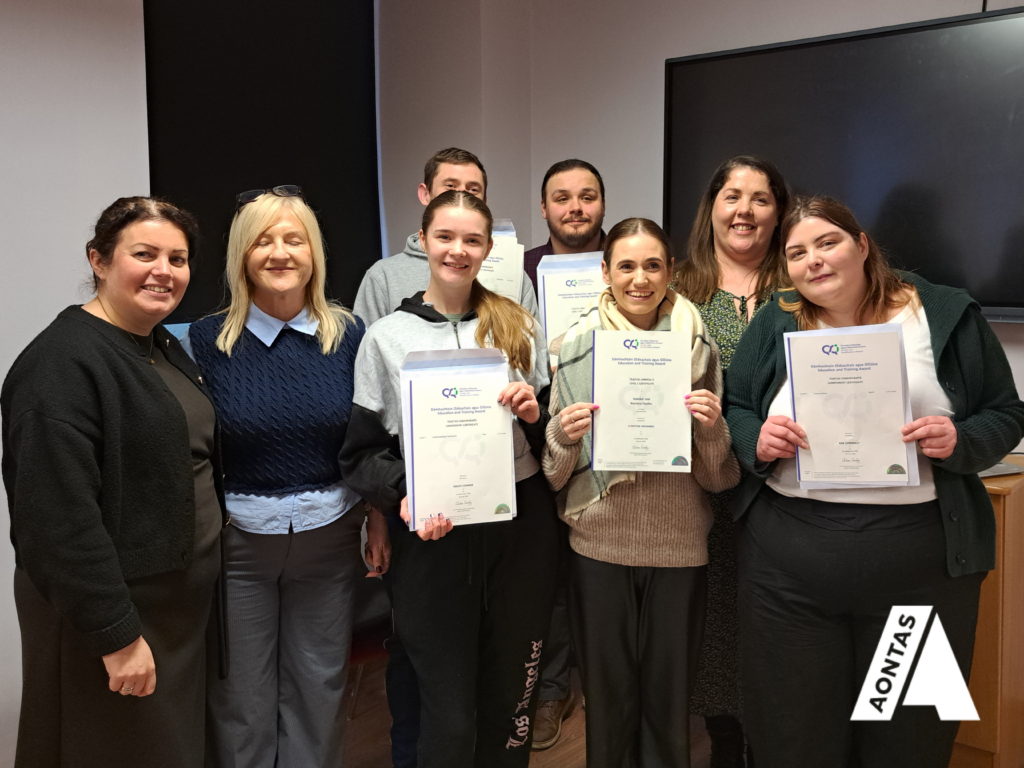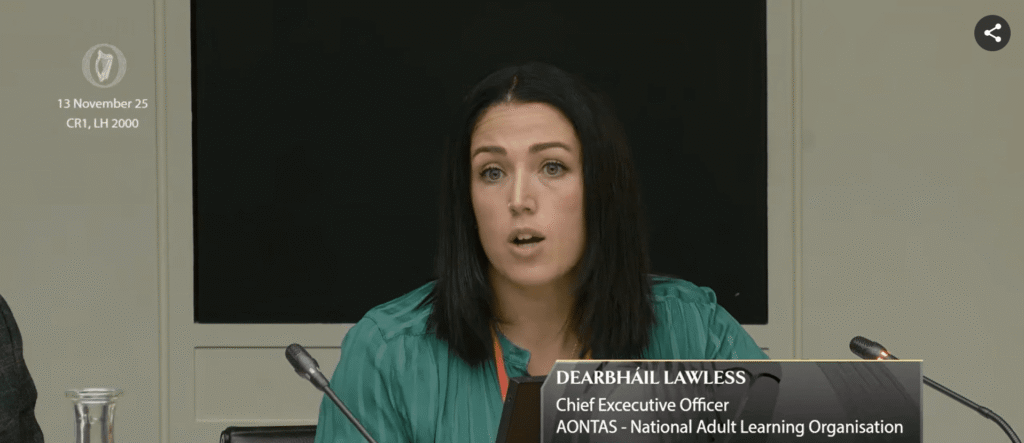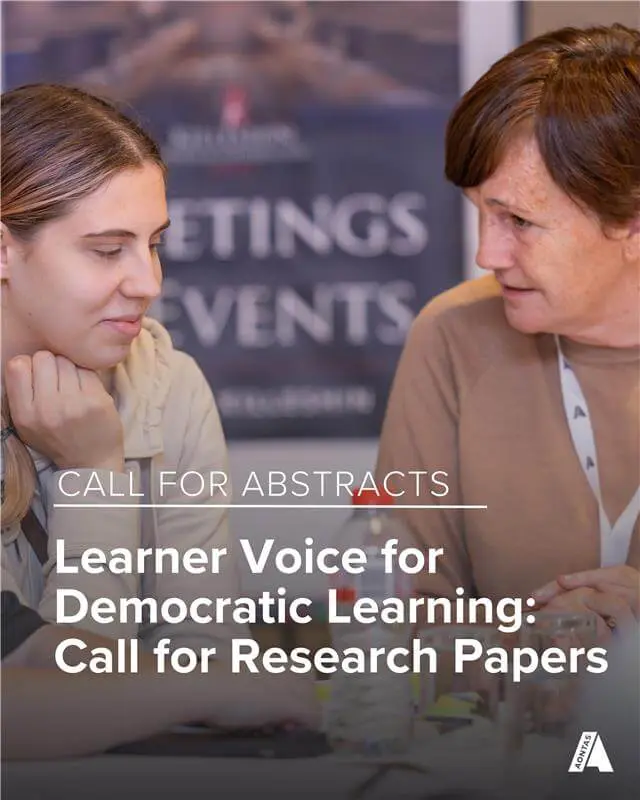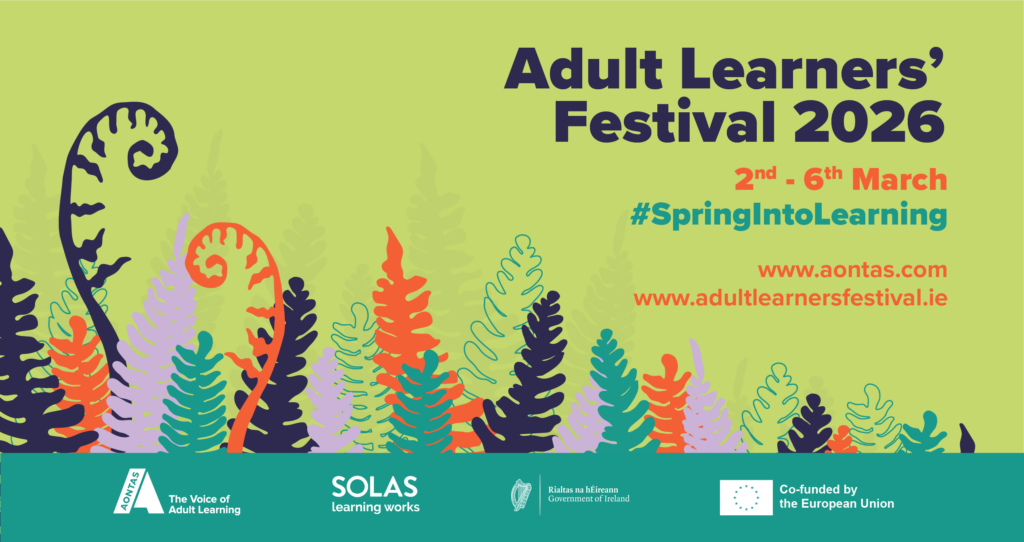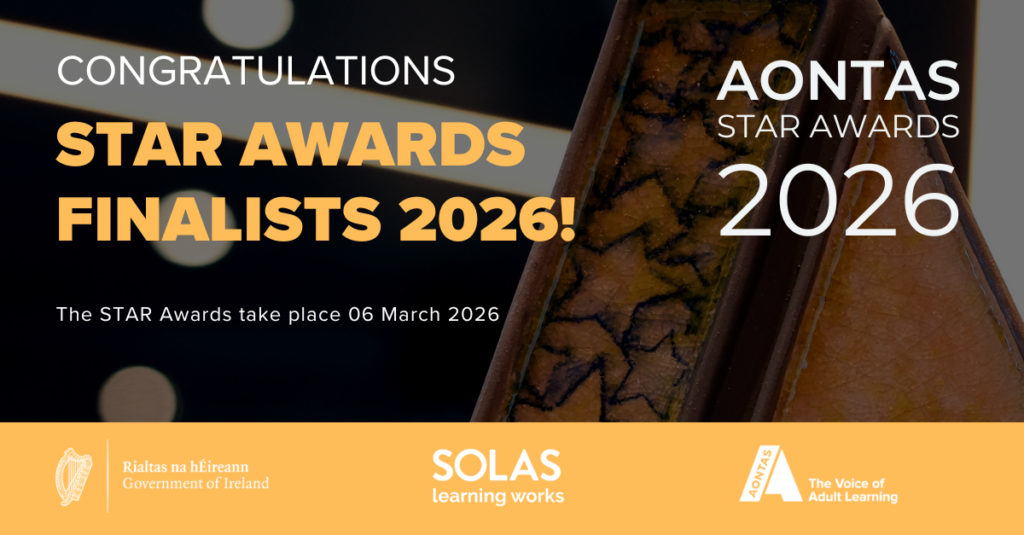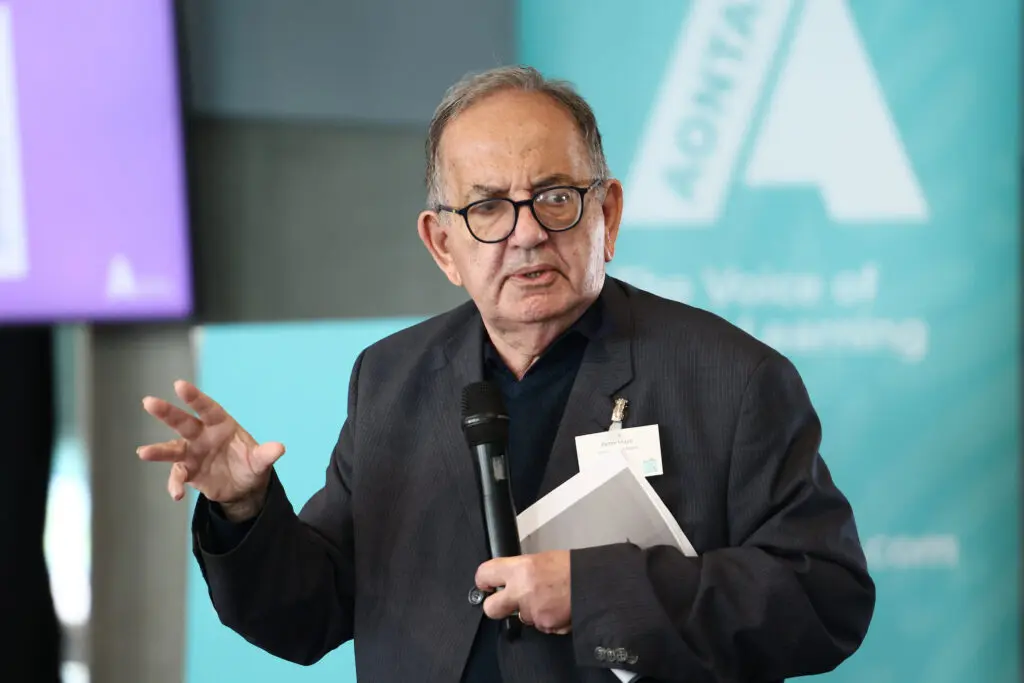The document also pledges to create “a caring society” and address poverty and social exclusion. This caring, equal, safe society cannot exist without community education.
“Community education is well-placed to address the social problems of our times because it is local, flexible, and individualized with the capacity to empower people and communities, especially those who don’t have the same kind of access or opportunities in the traditional education system.”
That’s according to our CEO Dearbháil Lawless speaking at the “From Politics to People” event in the Richmond Barracks in Dublin on Monday 3 March.
This event marked the launch of the 19th AONTAS Adult Learners’ Festival, and focussed the model of the “culture of care” that is the core of community education, and how this model should be adopted and embedded in all education policymaking in Ireland.
The event featured inputs and speeches from leading voices in the adult and community education sector, SOLAS, and activism and advocacy.
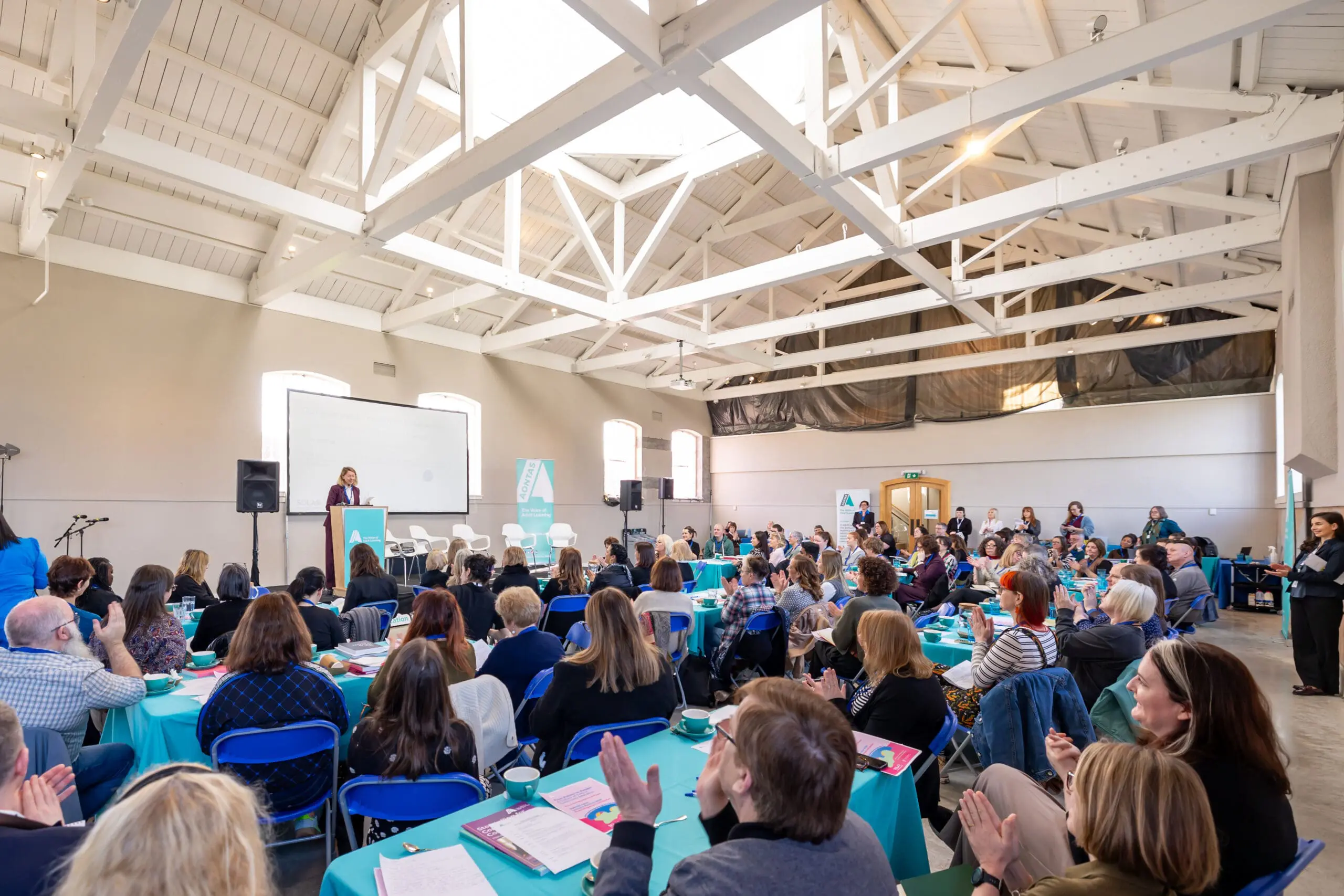
The theme was inspired by the significant social challenges in our society and the recognition that a culture of care has not been priortised by policymakers and politicians in Irish society.
This is clear from the increasing focus on the privatisation of public services, the reduction of citizens to customers and human beings to human capital, and an undermining of the suffering and hardship of so many people.
More funding and support is badly needed for organisations and groups working to connect communities and offer learning to people that fits their circumstances and needs. Funding cuts to community education providers have been taking place across the island.
One main inspiration for the event was the work of Professor Kathleen Lynch, who has stated that the Irish Government has been “privatising necessary public services like childcare”, meaning that “many people can’t access education because they can’t afford it.”
She has said that because we have “changed the definition of a citizen from a person with rights to a person who buys services”, we are “deprioritising services that are not market relevant, like mental health”.
The result is that formal education that serves the economy – and workers – takes precedence over education that supports personal development and community wellbeing.
Read more about the background to the event here.
Keynote from Activist Caoimhe Butterly
Human rights activist and educator Caoimhe Butterly gave the keynote address. Caoimhe has spent twenty years working in humanitarian and social justice contexts in Palestine, Iraq, Lebanon, among other places, and with refugee communities in Europe. Caoimhe spoke to the audience of 80 attendees with passion and empathy:
“Against the tempestuous storms of injustice and oppression that so many communities are facing – what is our response? Sometimes policies are reduced to metrics. But adult education is the opposite of that – it’s about people, their lives and their stories.”
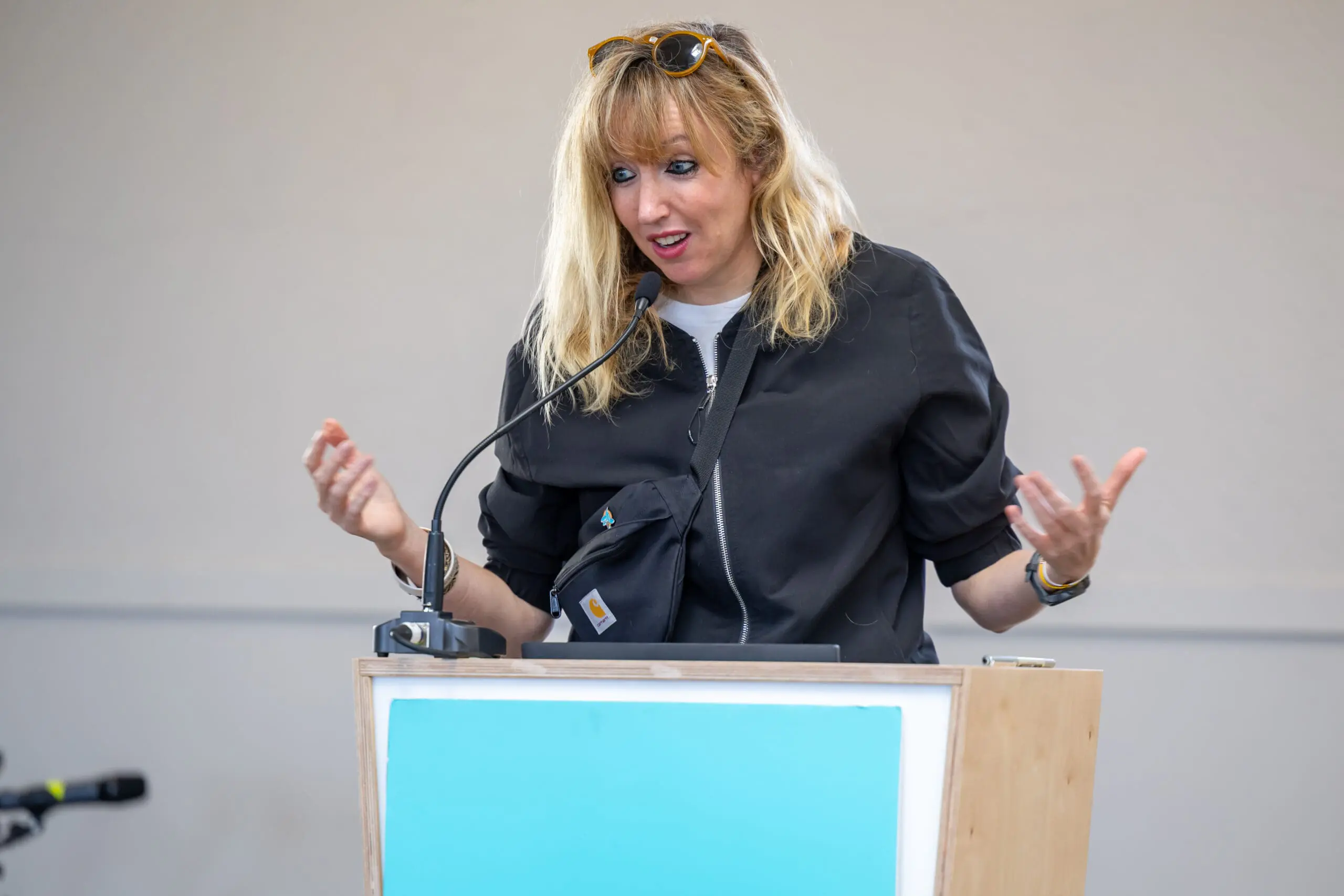 She talked about the idea of resilience for those working in adult and community education as a tree, and an “ecosystem of collective care”, with roots the nourish us, keeping us solid and stable, and branches reaching out towards the future and our ideals.
She talked about the idea of resilience for those working in adult and community education as a tree, and an “ecosystem of collective care”, with roots the nourish us, keeping us solid and stable, and branches reaching out towards the future and our ideals.
Speaking about the theme of the morning and the model of the culture of care, she said:
“The gulf between those who create policy and those who carry the lived experiences is often very wide.”
This resonated with the performance from Women’s Collective Ireland (WCI) Ronanstown Drama Group, a group of women who presented three spoken word poems exploring homelessness from a feminist perspective. The performance brought to life, in the room, what community education is and what it means for people, including a sense of belonging and the opportunity to be seen and heard.
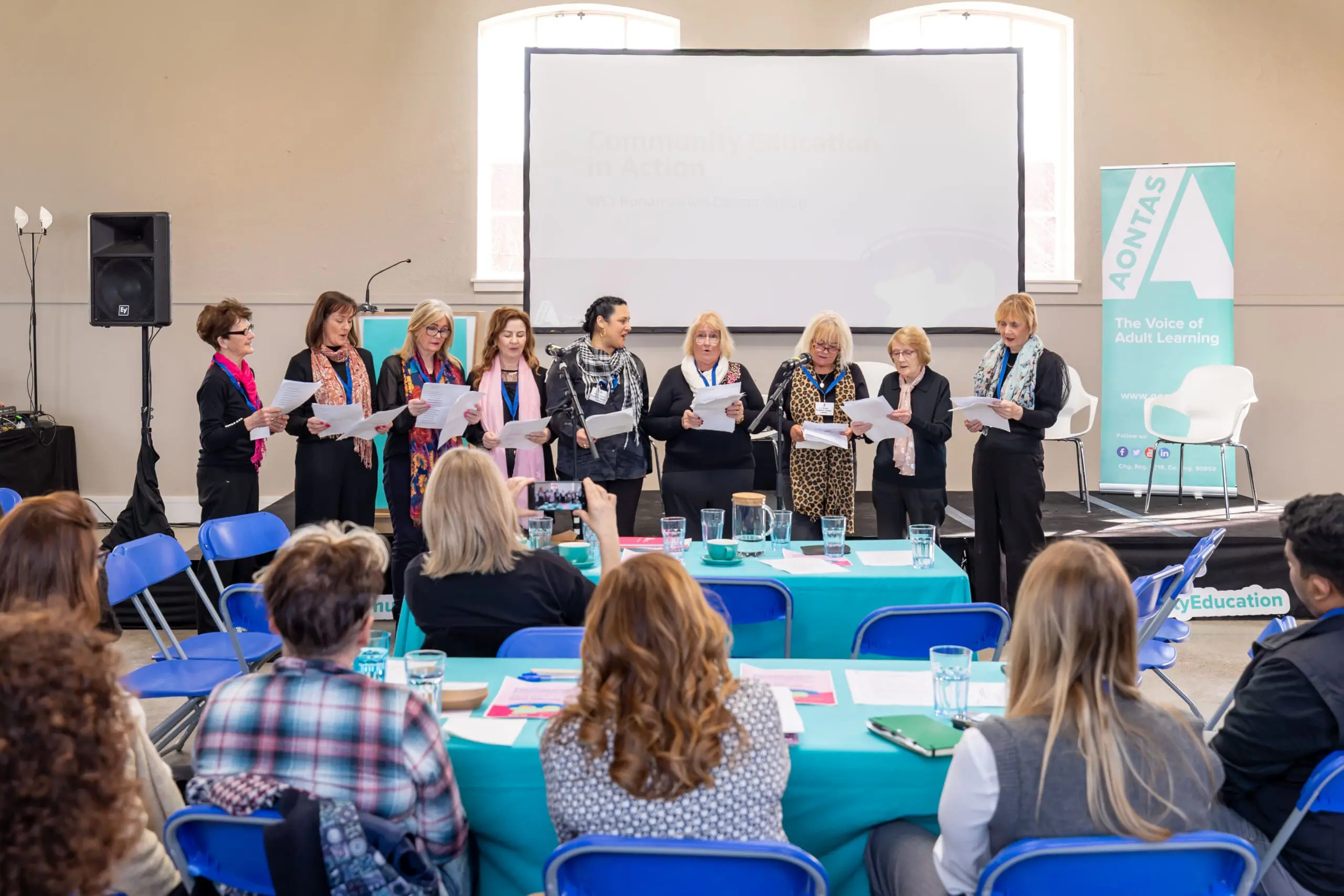
We also heard from Nina Burke from SOLAS, who provided an update on the Community Education Framework. She said that SOLAS counted 46,000 community education learners last year – though we know this does not account for all groups of learners in community education, including, for example, learners over 65.
Nina said there has been a “steady growth” in numbers over time. She referenced the “Wider Benefits of Learning” tool currently under development with ETBI, which will take a “wellbeing framework approach”, and about community education providers having “a seat at the table and a voice” in new developments for the sector.
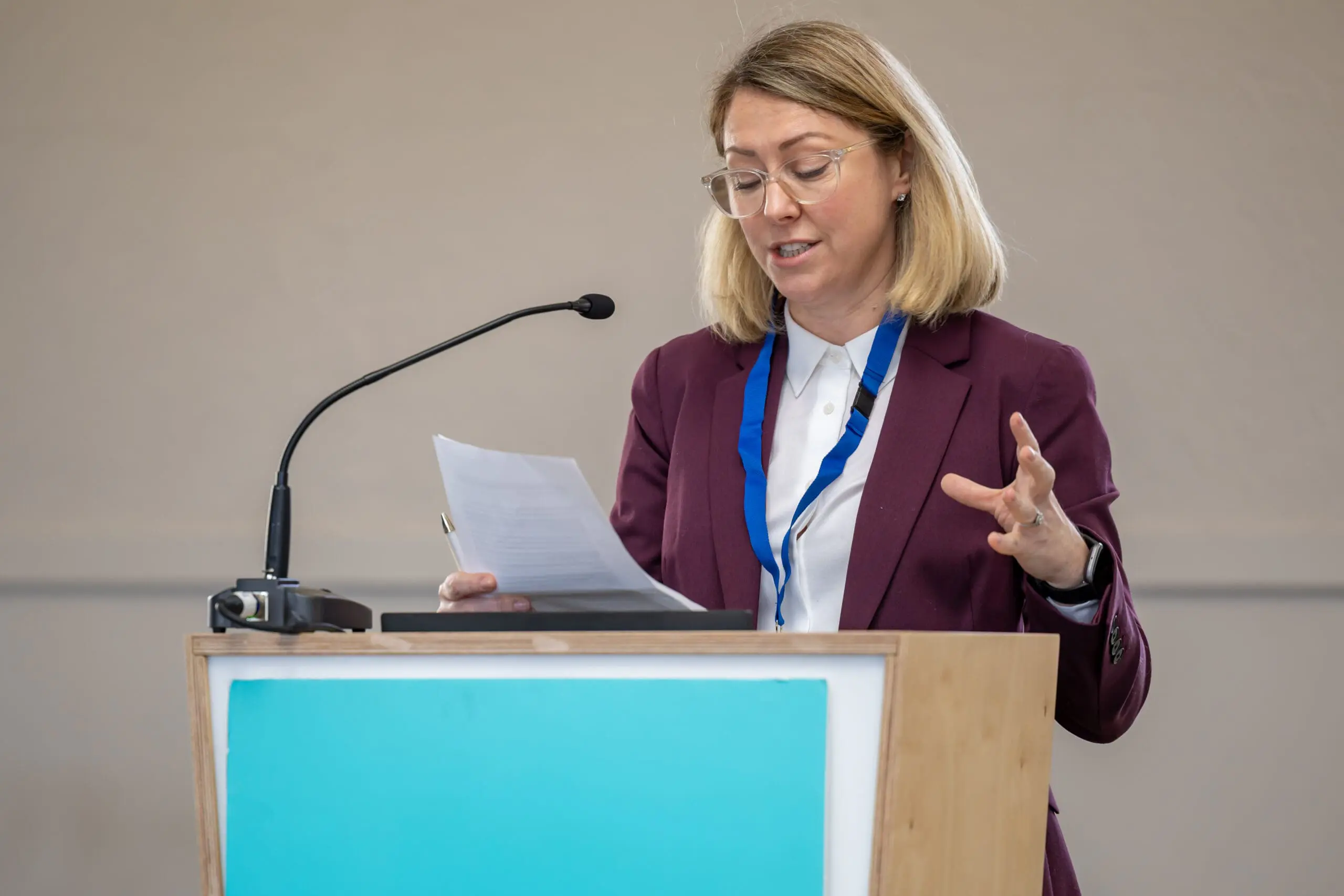
Panel Discussion: “They didn’t walk in front or behind, but beside me”
Challenges in community education were the main focus of a panel discussion that followed, where Community Education Facilitator Áine Whelan, from Waterford and Wexford ETB, spoke about the increased emphasis on online registration and digitalisation.
At a time when banking and public services like the post office are all being depersonalised and moved online, Áine – who is a representative of CEFA (the Community Education Facilitators’ Association) – spoke about the harmful impact of the digital divide for communities. This is especially important for more vulnerable communities, including older people and Travellers, who need personal contact and communication to engage in courses or groups.
“We need to listen to those furthest from education before we roll out online registration in community education,” Áine said.
Also speaking on the panel was Finbarr Savage, former learner in community education with the INOU and now a student in TU Dublin Blanchardstown. Finbarr described “the care, compassion, support and kindness of all the community educators”, and how they “they met me where I was at.”
“Community education has transformed my life,” Finbarr said. “After leaving school at 15, it was daunting to go back to education – but the kindness and compassion of the community educators shone through. They didn’t walk in front or behind, but beside me.”
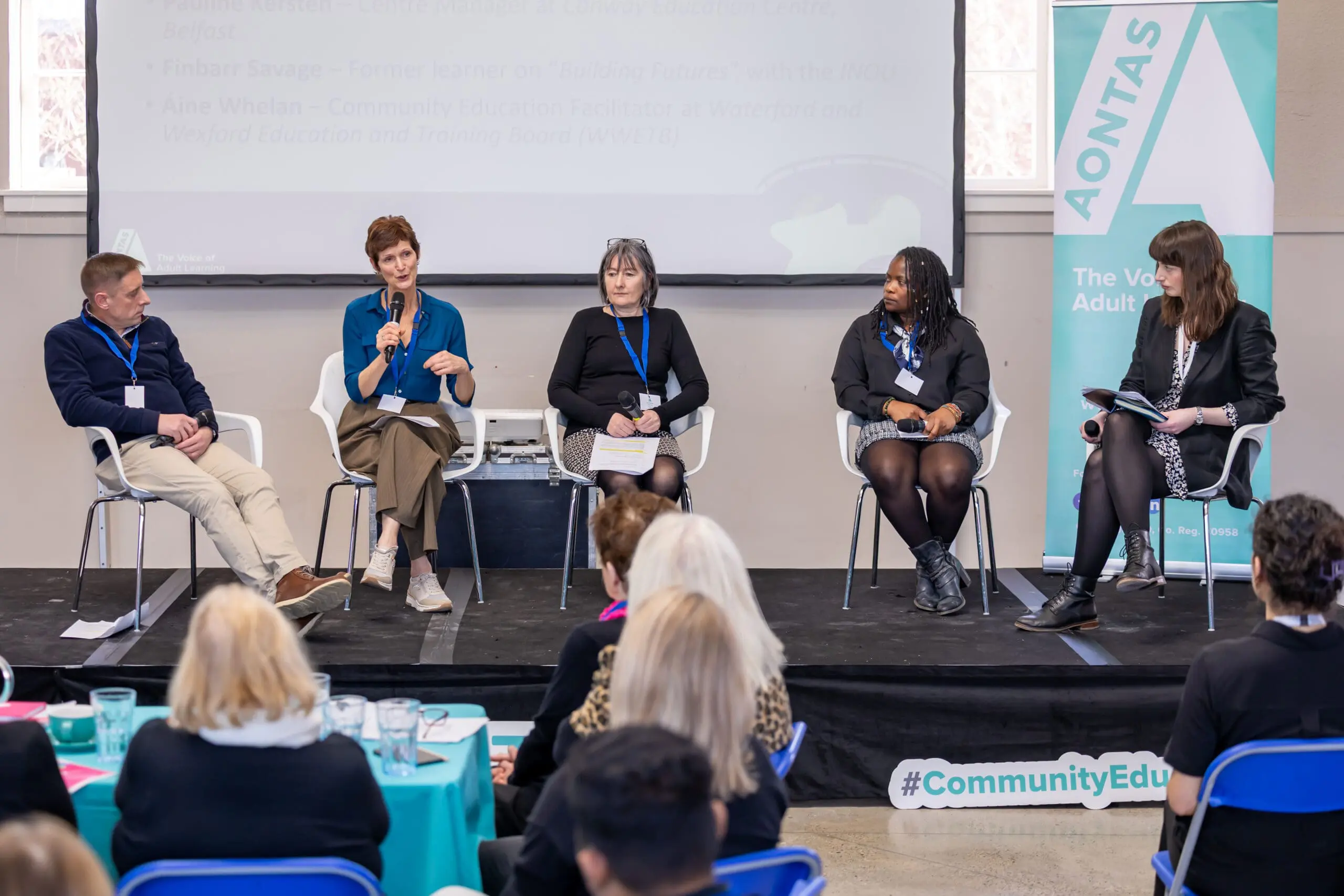
Another speaker was Rosey Kunene, an “edupreneur” and founder of Dignity Partnership, supporting migrants, refugees, and new communities to learn, gain new skills and awareness, and develop a “growth mindset” as they integrate into Irish society. Rosey talked about “information poverty” and the lack of access newcomers have to knowledge about how education systems work in Ireland. She talked about supporting individuals and their needs in a structured way so they have the stepping stones they need.
Also speaking on the panel was Pauline Kersten, centre manager at Conway Education Centre in Belfast. Pauline spoke passionately about the positive impact community education has on people’s lives, and the need for proper funding and resourcing, especially in Northern Ireland. At her centre, staff and volunteers help many groups of people, including migrants and refugees. Through community education, they don’t just access learning but they connect with others and integrate “in a natural way.”
“Community education is a powerful tool for integration, for the host community to learn more about the new communities, and for the new communities to feel more comfortable and know their new neighbours,” Pauline said.
We also had roundtable discussions, where attendees shared their ideas. The team at AONTAS recorded their feedback, and it will all contribute to our advocacy work and research throughout the year.
One key theme that kept coming up was the digital divide and the move to online registration, as well as the invasive level of information asked of potential learners, which discourages many from coming back. This has the effect of excluding and alienating people, especially in rural areas.
Another interesting point was about the social justice element at the core of community education, where people are both learning something but also encouraged to become local activists. One speaker said that if something matters to you, like childcare or transport, you’re more likely to take it on, when you know more about what you can do.
“Whatever is personal, becomes political”, through community education.
Another important idea that came through was the expertise of community education workers and the networks and connections that are on offer for learners, which are often not clear to policymakers. Learners find out about services like childcare, transport, funding options, next steps in education, or connections with employers. This is such an essential part of our education system which continues to be under-recognised.
Other issues that came up were around precarious contracts, vulnerability for providers especially of non-formal learning, and the high levels of administration and bureaucracy required which takes time away from building and maintaining relationships with learners.
“Education is a political act”
Rounding off the event was academic Professor Camilla Fitzsimons, Head of the Department of Adult and Community Education at Maynooth University. Camilla gave a broad view of the political and socio-economic context behind the day’s discussions, focusing on how we are all working and coping within a neoliberal and capitalist system, in which care for people and the collective are deprioritised in favour of the market and “transferring wealth and power to the super rich”. 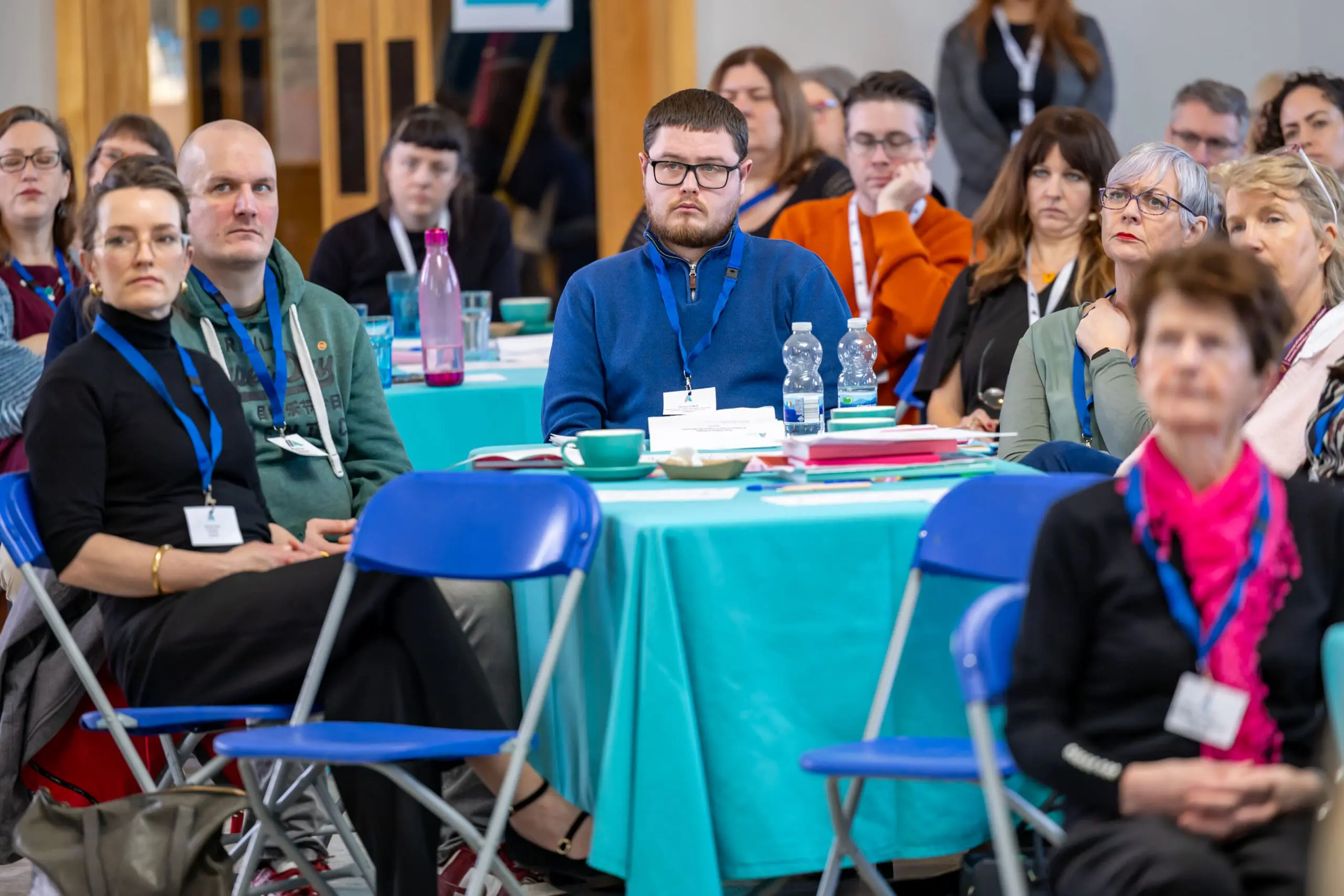
“We live in an unequal world,” she said, “with the extreme division between the haves and have-nots, with an economic model of outsourcing and commodifying public services, including education that is bought and sold. Even when we think we’re not being political, we are being political. Education is a political act.”
She talked about how meritocracy – the idea that if you work hard enough you will be rewarded – is a myth, and people working in the community education sector have seen this time and time again.
She also mentioned how language, for example terms like “empowering” and “inclusion”, can be used to gesture at helping people without any follow-through in terms of funding and resources, often resulting in disillusionment and frustration for people who are vulnerable.
Echoing some of the points raised in the discussion groups, she talked about the need for consciousness-raising, unionisation, and the open naming of oppression by those in power – rather than putting the blame on the people being oppressed.
“Even when we think we’re not being political, we are being political,” she said. “We are either maintaining the status quo by not calling things out, or we are calling things out and encouraging people to question.”
Offering advice to those working in the sector who may be feeling dejected or hopeless in difficult times, she said: “We must make sure that we do things in our work that build a sense of hope and a sense of possibility. Focus on little things you can do, and those little things can grow into something bigger.”
We will be producing a policy paper based on the main findings from this event, and it will inform further work throughout the year, including a public awareness campaign on community education.
About the Festival
The Adult Learners’ Festival, happening this year from 3rd to 7th March 2025, is a nationwide celebration of adult learning. This year’s theme is “Connecting Communities”. Adult and community education is the bridge that connects communities across the island of Ireland. Visit this page for more details about the Festival
Find us on X/Twitter, Facebook, Instagram and LinkedIN for the latest updates #ALF25 #LearnTogetherLiveTogether
For more information, contact alf@aontas.com
